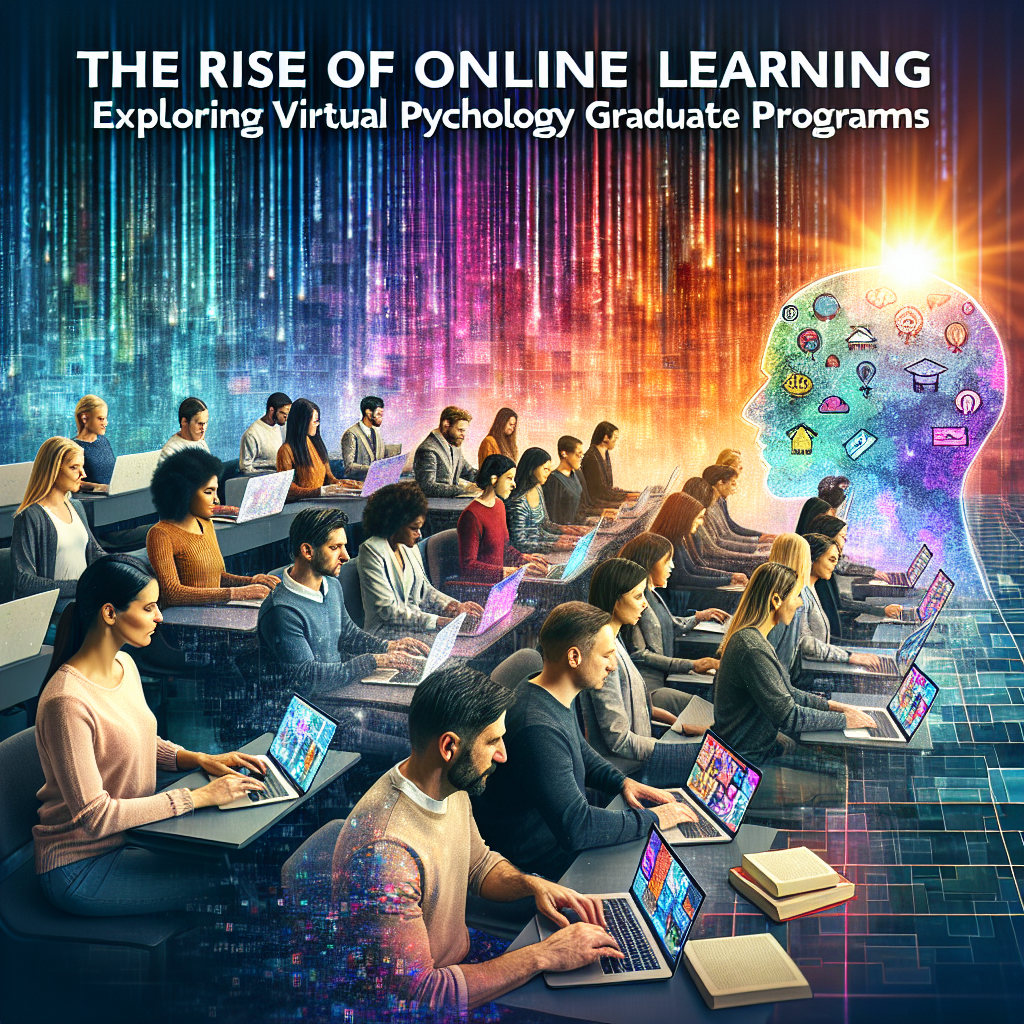
In a world where technology permeates every aspect of our lives, education has undergone a dramatic transformation. The rise of online learning has reshaped how students access knowledge, particularly in specialized fields like psychology. In this article, we will delve into The Rise of Online Learning: Exploring Virtual Psychology Graduate Programs, highlighting its advantages, challenges, and the unfolding opportunities that await aspiring psychologists.
Introduction
Imagine a service that opens the door to education without physical limits—an offering that brings lectures from seasoned professionals right into your living room. Online learning has not only democratized education but has made it possible for individuals from all walks of life to pursue their passions, including the intricate and impactful field of psychology.
With the global pandemic accelerating this shift, virtual psychology graduate programs are gaining unprecedented popularity. The essence of this article is to navigate through the evolving landscape of psychology education, revealing how online learning presents a robust solution for students seeking advanced degrees in this vital field.
The Evolution of Online Learning
Historical Context
Online learning isn’t a novel concept; it traces its roots back to the late 20th century when the internet started to gain traction. However, the acceptance and development of virtual education were gradual. Initially viewed with skepticism, the landscape began to change with advancements in technology.
The Surge Post-Pandemic
Fast forward to 2020, the COVID-19 pandemic forced educational institutions to pivot to online platforms, revolutionizing the perception of distance learning. This significant shift has made it clear: remote learning is here to stay. According to a report by the National Center for Education Statistics, enrollment in online courses surged by over 30% during this period.
Benefits of Online Learning in Psychology Graduate Programs
Flexibility: Students can access course materials any time, allowing them to balance work, life, and study commitments.
Diverse Program Options: Students are no longer limited to local institutions. They can select from a global suite of programs tailored to their interests and career goals.
Cost-Effectiveness: Many online programs opt for reduced tuition fees, eliminating costs related to commuting, housing, and materials.
- Personalized Learning Experience: With advancements in technology, online education platforms often provide customized learning paths and the ability to learn at one’s own pace.
Exploring Virtual Psychology Graduate Programs
Key Topics Covered
1. Curriculum Focus
The curriculum for online psychology programs often aligns with traditional in-person programs, covering essential topics such as developmental psychology, cognitive processes, psychopathology, and research methods.
2. Accreditation Matters
Accreditation is a vital aspect of selecting the right program. It ensures the quality and credibility of the education provided. Programs accredited by the American Psychological Association (APA) are best regarded.
3. Different Types of Graduate Degrees
Master’s Degrees
- Typically, a two-year program that provides in-depth knowledge and may include practical training.
- Doctoral Degrees
- Ph.D. or Psy.D. programs that involve advanced research, clinical training, and supervision.
Case Studies Highlighting Success
Case Study 1: The University of Southern California (USC)
USC offers a renowned online Master of Social Work (MSW) program that prepares students to address societal issues through psychology and social services. The program emphasizes skills like critical thinking and clinical practice.
Relevance: This program exemplifies the integration of real-world social work into psychological education, showcasing how online learning can prepare students for impactful careers.
Case Study 2: Arizona State University (ASU)
ASU’s online Master of Science in Psychology emphasizes data analysis and research, equipping graduates with necessary skills for careers in academia and clinical practice.
Relevance: ASU’s approach underlines the importance of research-oriented skills in psychology, demonstrating how online programs can adapt traditional methodologies to virtual settings.
| University | Program Type | Accreditation | Format |
|---|---|---|---|
| University of Southern California | Master’s in Social Work | CSWE | Fully Online |
| Arizona State University | Master’s in Psychology | HLC | Hybrid/Online |
The Role of Technology
Virtual education is heavily influenced by technology. Modern platforms utilize interactive tools, virtual classrooms, and artificial intelligence to enhance learning.
Access to Resources
Online psychology graduate programs offer students access to a vast library of resources, including research databases, academic journals, and professional networks, which may not be available in traditional settings.
Challenges in Online Learning
Despite its widespread acceptance, online learning is not without hurdles.
1. Self-Discipline Required
The flexibility of online programs can lead to procrastination. Students must develop strong time-management skills.
2. Perception of Quality
Some employers remain skeptical of the quality of online degrees. It’s crucial to choose accredited programs with a solid reputation.
3. Limited Hands-On Experiences
Programs traditionally include face-to-face clinical experiences; however, many online programs are starting to adopt virtual simulations and other innovative methods to bridge this gap.
Future Trends in Online Psychology Education
1. Technology Integration
The future of online grad programs is closely linked to emerging technologies. Virtual reality (VR) and augmented reality (AR) could play a role in practicing clinical techniques without a physical presence.
2. Hybrid Learning Models
Many institutions are leaning towards hybrid models, combining online learning with occasional in-person workshops or seminars, offering the best of both worlds.
3. Expanding Areas of Focus
As the field of psychology expands, so will the specialties offered in online programs, such as neuropsychology, behavioral psychology, and forensic psychology.
Conclusion
The rise of online learning is undeniably reshaping how we acquire knowledge in numerous fields, notably psychology. Aspiring students no longer need to be constrained by geographic limitations or rigid schedules. Instead, they can pursue quality graduate programs that fit their lifestyles and career aspirations.
With the growing acceptance of virtual psychology graduate programs, the opportunity lies not just in acquiring a degree, but in building skills that will impact countless lives.
In this new era, take charge of your education; embrace the possibilities that The Rise of Online Learning: Exploring Virtual Psychology Graduate Programs offers—it’s your journey, and it begins now.
FAQs
1. Are online psychology programs as reputable as traditional ones?
Yes, many online programs are accredited by recognized bodies, ensuring they provide quality education equivalent to traditional schools.
2. How do online classes work for psychology programs?
Online classes typically involve lectures, discussions, group work, and assignments delivered via a learning management system.
3. Can I complete internships or practical training online?
Many programs offer virtual internships and field experiences, often supplemented with residential sessions for hands-on learning.
4. What technology do I need for online learning?
A reliable computer and internet connection, along with software for video conferencing, are essential for successful participation in online programs.
5. How can I stay motivated in an online learning environment?
Set specific goals, maintain a fixed schedule, and engage with your peers and instructors to create a supportive learning community.
In this comprehensive exploration of The Rise of Online Learning: Exploring Virtual Psychology Graduate Programs, we’ve examined the evolution, benefits, challenges, and future prospects of online education in the field of psychology. The opportunity to redefine your career path is at your fingertips—now it’s time to act!















